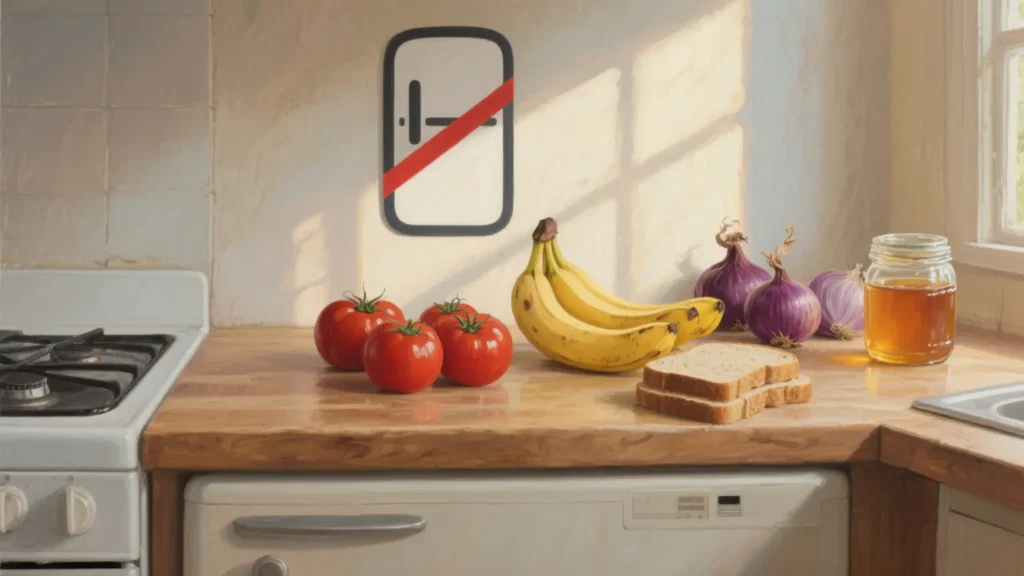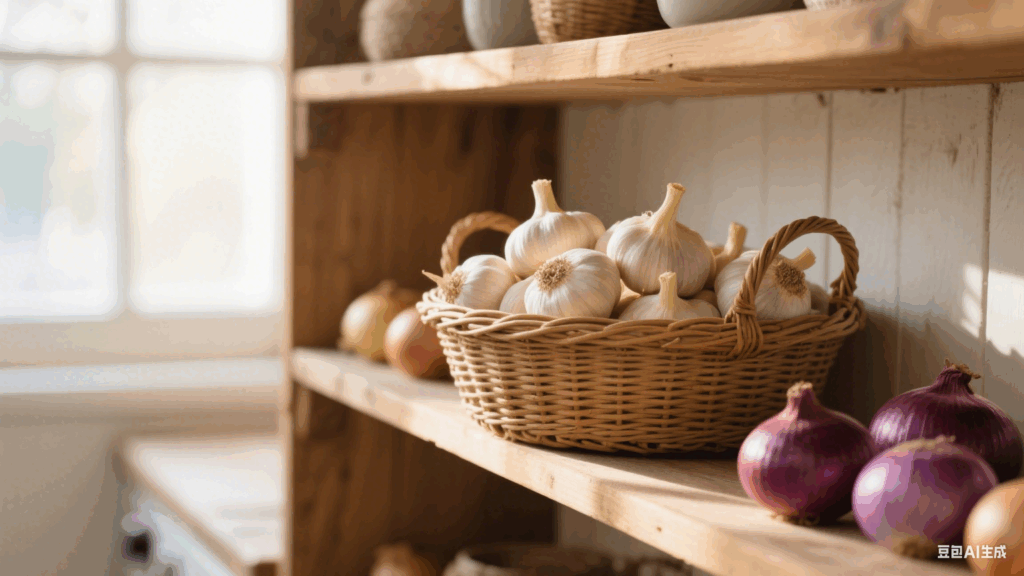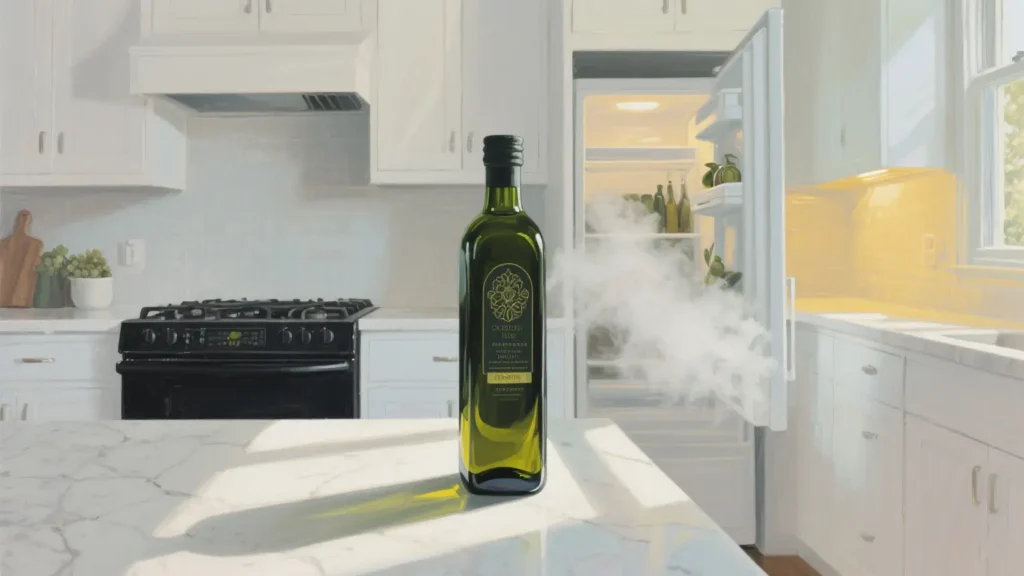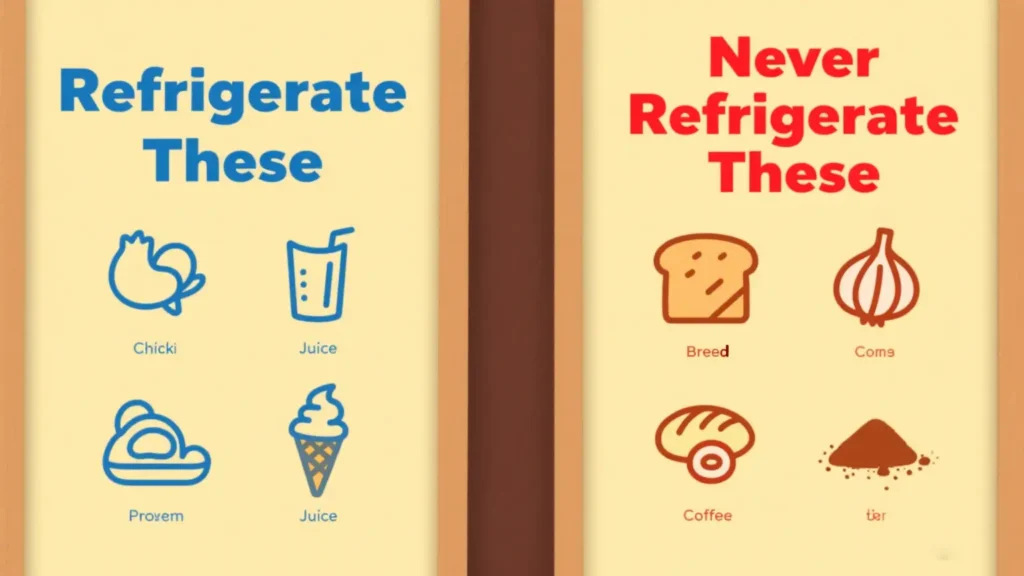Were you ever impulsively moved things into the fridge thinking that it would keep them fresher? It is a common habit for many of us to think that cold air is necessary to maintain the freshness of the product. However, not all of the foods we find in the fridge can be said to be in a beneficial environment. Most of them can lose their taste, flavor, and nutritional value; or what is worse, become rotten even faster.
Refrigeration is not a universal solution. Being aware of the fact which products are more durable when kept at room temperature can prolong the shelf life, reduce the quantity of waste, and increase the flavor. Here you will find the top 10 foods that should not be refrigerated along with the reasons why you shouldn’t be doing so.

There are Several Reasons Why Refrigeration is Not Always the Best Option
A refrigerator is a device that operates by maintaining the proper level of temperature so as to decrease the bacterial growth in the food. While doing so, perishable items can be preserved well, yet items with a particular chemical composition or moisture level can be negatively affected. There are foods that produce ethylene gas and when they are placed somewhere in a small space the gas speeds up the process of decay. Others during the time being in the fridge experience the process of their only starch turning into sugar or in the process of the cold their roots get dry.
Understanding these facts puts you in a more comfortable position to decide what is best and what is not for your kitchen. Now we are going to examine the 10 things that you should not keep in the fridge although most people commonly do.
1. Tomatoes
Tomatoes are tasteless and develop a mealy texture in the refrigerator. This low temperature prevents the natural ripening process and not only that it affects the walls of cells and also the fruit will get too soft.
Storage tip: Keep the ripe tomatoes at room temperature, placing them with the stem down and out of direct sun. When completely ripened, consume them in a few days.
2. Potatoes
If you put the potatoes in the refrigerator, the starch in them will turn into sugar faster, which will make them taste sweet and have a discolor flesh when you cook them. There is a high level of acrylamide, one of the potential carcinogens, as well.
Storage tip: Use a paper bag or a basket and keep them in a cool, dry, and ventilated place, out of sunlight.
3. Onions
Actually, the fridge’s cold and humid air can result in onion rot, where it gets soft, rots, and even sprouts. Moreover, the strong smell can easily spread to the other food products nearby.
Storage tip: Store whole onions in a well-ventilated, dark, and dry place. Once cut, they should be in a sealed container and kept in the fridge for subsequent use for only a few days.

4. Garlic
Under fridge temperatures, the garlic cloves will turn tough and sprout quicker than usual. The refrigerator drawer is also susceptible to mold growth and thus will absorb the garlic’s pungent scent.
Storage tip: Hang the garlic in an airy, cool place using a net bag or an open basket. Such places should be preferred to plastic bags, which are prone to storage of moisture and hence……..
5. Bread
Storing bread in the refrigerator speeds up its moisture evaporation, causing it to become stale quickly. On the other hand, though, cold temperature can deter the growth of molds, the starch will retrograde and ultimately lead to low moisture content and hence it becomes stale.
Storage tip: It is best to have a bread box at room temperature. To keep it for an extended period, freezing will also be an option, but it must be toasted or heated before you can use it.
6. Bananas
Although the freezing point of the banana peels is neither retreated nor improved under cold temperatures, it will result in the appearance of brown or black peels. Thus, the inside of the fruit will lose sweetness and become mushy.
Storage tip: The bananas should ideally be placed on the countertop. The process of ripening can be delayed to some extent by the separation of the fruit.
7. Coffee Beans
Fridge moisture can be the cause of coffee beans’ oils losing aroma, thus ending up with a flavorless taste. Another case is that the beans can get odors from other products.
Storage tip: Use an airtight container and locate it in a dark, cool place preferably inside a cabinet. Also, avoid clear jars that can let light in.
8. Honey
Honey is naturally immune to spoilage because the water content is minimal. Storage in the refrigerator accelerates the freezing process, and honey becomes crystallized, obtain a sandy texture hence is not easy to spread.
Storage tip: Place honey in a sealed jar at room temperature away from the heat.
9. Olive Oil
Olive oil, under cold conditions, changes its state into a solid form, becomes hazy, and gains the texture of wax. Such transformation is reversible if not repeated frequently as it can make the oil taste bad.
Storage tip: Keep olive oil in a dark bottle in a cool place. Avoid using open counters near to the stove.

10. Whole Melons (Uncut)
Not only watermelons and other melons shed their feats as antioxidants while being chilled in refrigerators, but the fridge also causes a break in the natural ripening process.
Storage tip: Keep the whole melons on the counter. It is only when cutting it that you need to wrap and refrigerate the leftovers.
Kitchen Storage Tips to Extend Freshness
A clever way of storing food, which is not just about the fridge, involves extra kitchen storage methods to keep the food fresh for the maximum time possible. Here are some general kitchen storage guidelines to maximize the shelf life of your groceries:
- Breathable containers: Produce like garlic and onions are less prone to mold when kept in mesh bags or baskets due to the circulation of the air.
- Zones for different items: Set apart some shelv
- Do not expose the lighting: For most of the food that is rated at room temperature, the heat and the light are the two major agents of growth that spoilage feeds on, and therefore such products need to be at the right temperature and away from direct sunlight.
- Self-examine the origin of ethylene: The emanation of ethylene gas, which is a natural ripening hormone, from the ripening of other fruits like apples or tomatoes, will hasten the spoilage of the more sensitive vegetables and fruits. Hence segregating them is a good policy.
Why This Matters: Saving Taste and Reducing Waste
Being aware of the fruits that you should not chill does more than just save their flavor; it also prevents food spoilage and wastage as well as saves you money. It is a fact that improperly stored food is the cause of large dollar sure losses all over the world. If you store your food properly, you actually make your home more effective and sustainable as well as less waste.
Consider the overripe tomato that you discarded or the quickly abandoned piece of bread. These ordinary household foods that do not need to be stored in the fridge can survive if they are handled correctly in the natural environment.

Final Thoughts
Although the fridge is a useful appliance in the kitchen, it is not meant to be the depository of all your food products. To succeed in that, knowing what to keep out of the fridge not only preserves it but also retains the taste, nutrition, and lifespan of the food.
Before you put the groceries away, take a moment to think whether it is necessary to refrigerate everything. The guide will help you to improve the taste and shelf life of the food, and in the process, you will consume less fresh supplies of it.
To receive more tips and tricks on how to make things easier for yourself in the kitchen and the art of food storage, sign up for our newsletter and get regular updates from our cooking professionals.